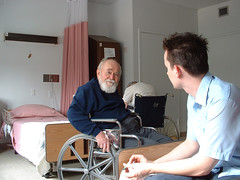"An article about the importance of quality care plans and the purpose of them in the medical profession."
 |
Photo license:   Some rights reserved Some rights reservedImage source |
The care plans essentially give nurses more power than they have when it comes to qualifications. Although nurses cannot diagnose illnesses they see a lot more of patients than doctors, physicians and surgeons so they see a lot that doctors don't always pick up on. The quality care plans allow nurses to give the patients the care that they need rather than sticking strictly to the doctor's guidelines.
Another reason the care plans are so important is because they make sure that the care given to patients is consistent. Patients won't always have the same nurses all of the time so the care plan means that when there is a shift change over, the new nurses can utilise the information on the plan to provide the same level and quality of care that the patients were receiving before.
The care plans also help to increase the effectiveness of a patient's treatment because it means that each patient is treated as an individual. The care plans mean that the nurses can assess each patient individually and [provide them with the care and treatment that they require as individuals rather than trying to shoe horn treatment into a 'one size fits all' approach.
Although the care plans are mainly intended for nurses, other members of the medical team can use them too. As the care plans are accessible to everyone it means that other members of the medical team can tailor treatments to work within the plan set out by the nurses to make sure that the treatment the patient receives is most beneficial to them. For example, if a nurse has noted that a certain patient may be at risk of depression as they are not willing to take part in any kind of social interaction then other specialists may choose to have that patient take part in group activities in order to try to get them engaged with other people.
The care plans aren't just for medical staff either as patients can benefit from them too. When on the road to recovery it's important for nurses and patients to set realistic goals in order for them to succeed and the care plans not only allows patients to see their goals, but also what they have to do in order to meet them.
Gaynor Barratt works closely with nurses in the NHS in order to create nursing care plans that fit in with the standards laid out by ukqcs.co.uk.
 |
Photo license:   Some rights reserved Some rights reservedsource : http://flic.kr/p/6dT92k |
Caring for an Alzheimer’s patient requires the caregiver to possess a special set of skills and a deep understanding of the disease. It can be a challenge to meet the needs of the patient as the disease progresses. Dealing with an Alzheimer’s patient on a daily basis requires patience and a caring nature.
Communicate Clearly
When you are communicating with an Alzheimer’s patient it is important to keep it simple. Your words should be simple and keep your sentences short. Make sure your responses when you are having a conversation with the patient as well as when you are giving directions to the patient are short and clear. It is best not to argue with the patient. Alzheimer’s patients can become easily confused and upset when they are contradicted. Don’t argue or correct the patient, instead simply redirect his or her attention to a new topic. In addition, in order to keep the patient focused on what you are saying, it is important to make eye contact and minimize any potential distractions.
Establish a Routine
Alzheimer’s patients respond best to a daily routine. This is because as the routine becomes familiar and he or she knows what to expect. As you establish a routine it is a good idea to let the patient know what is expected of him or her next. For instance, if it is time for the daily bath, tell the patient the steps you both will follow in order to accomplish the bath. This procedure takes the fear of the unknown out of the process and gives the patient something to focus his or her attention on. Among nursing home jobs, becoming a caregiver for an Alzheimer’s patient is one of the most challenging and one of the most rewarding jobs.
Be Positive
Perhaps the most important requirement for working with Alzheimer’s patients is to be positive in your interactions with them. They now inhabit a confusing and sometimes frightening world due to this disease so the caregiver needs to reassure the patient with positive reinforcement. The very nature of the disease ensures that the patient will make mistakes and experience misunderstandings. It is to be expected. As a caregiver, it is your job to help the patient experience life in a safe and positive environment. Most nursing home jobs require that the caregiver possess a warm and caring nature in order to deal with patients that can sometimes be difficult.
I am a blog writer with an interest in home care jobs and opportunities. I contribute to health and medical blogs whenever I have free time.

